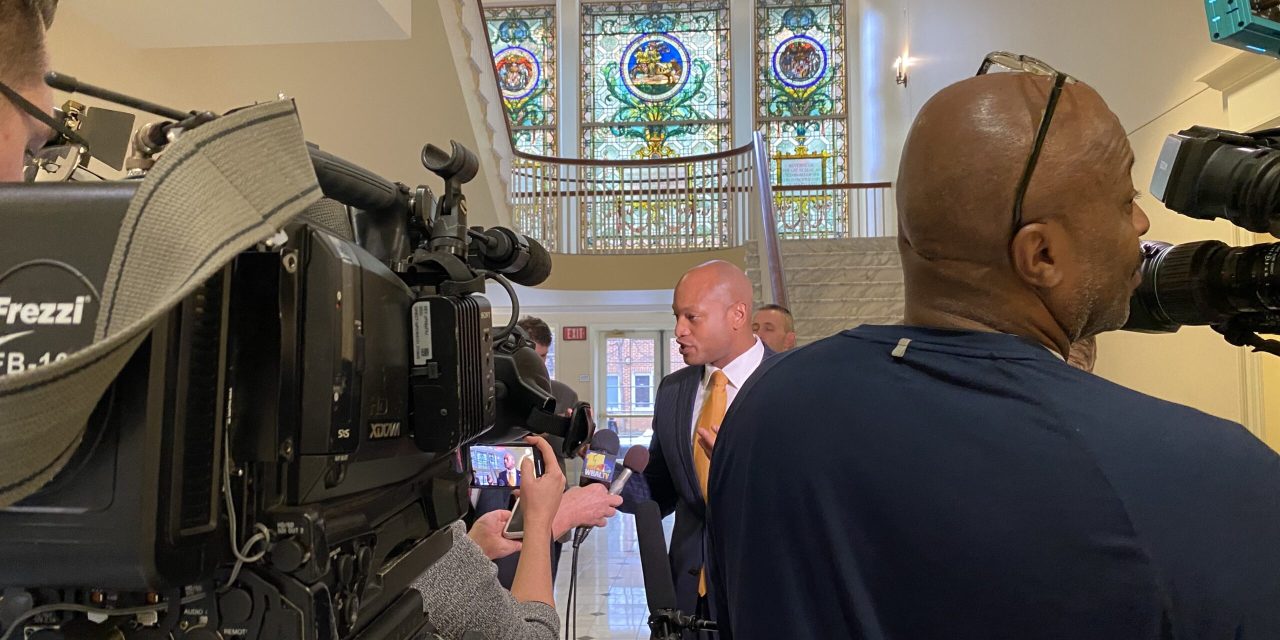By KARA THOMPSON
ANNAPOLIS, Md. — Gov. Wes Moore testified Thursday in support of a bill that would give military retirees a larger tax break, one of the pieces of legislation his administration requested the Speaker of the House to submit for this session.
“What this would allow us to do is stay consistent, and keep pace with our neighbors,” Moore said in his testimony. “It can become Maryland’s decade because our veterans can do what they’ve historically done, which is help to lead the way.”
The law applies to individuals who receive retirement income — including death benefits — as a result of being inducted into or a member of the U.S. armed forces, a member of the Maryland National Guard or serving in active duty in the corps of the Public Health Service, the National Oceanic and Atmospheric Administration or the Coast and Geodetic Survey.
“The talented staff of the Department of Veterans Affairs and I are solely focused on serving those who have served all of us,” said Anthony Woods, acting secretary of the Maryland Department of Veterans Affairs, who testified favorably. “This bill will help us to carry out this mission while diminishing the financial factors that cause veterans to leave the state they call home.”
Currently, those eligible retirees over the age of 55 must pay taxes on income above $15,000, while those under 55 have to pay tax on income above $5,000. The proposed bill would make the subtraction modification the same for everyone, regardless of age.
HB554, which is cross-filed in the Senate as SB553, increases the amount of money individuals can subtract from their income tax to $25,000 for tax year 2023, and raises it again for tax years 2024 and beyond to $40,000.
“This bill will save veteran families an estimated $30 million annually,” said Moore. “The true benefit of this bill cannot be reflected in dollars and cents, though. The true benefit of this bill is that it’ll keep people—like the ones who are behind me — here inside the state of Maryland.”
The Keep Our Heroes Home Act, as it’s also referred to, has 69 sponsors in the House. Keeping with Moore’s pledge of bipartisanship, 14 of these delegates are Republicans.
During the hearing on Thursday, eight people testified in favor of the bill, including the governor. There was no in-person unfavorable testimony.
“As we made clear by the members of the panel, their veterans’ community continues to serve long after they have taken off the uniform,” the governor said. “These are people who have shown a commitment not just to country, but also a commitment to community, and people who will have a continued opportunity to do so, and our priority should be to make sure they are doing it here.”
The governor’s budget allows for $33 million annually starting in the fiscal year 2024 for this bill.
“These are veterans we need. These are veterans we want. These are the neighbors, these are the public servants, these are the community groups and the community group leaders that we want to have in our ranks,” said Moore. “The investments proposed in this bill are investments in our business community, our workforce, and the social fabric of our state.”
Maryland is one of just 14 states that does not have a complete exemption of military retirement income from taxation. West Virginia and Pennsylvania both fully exempt this income from taxation, and Virginia and Delaware’s exemptions outperform Marylanf’s current exemptions, according to legislative analysts.
“These are public servants, and these public servants are starting families, making friends, they’re building their lives here in the state of Maryland, and we cannot continue to lose them to other states,” Moore continued. “As I’ve said before, I refuse to let this state be a farm team for other states.”
Heidi Fleming, a retired Navy captain, agreed in her testimony that this bill will have a direct impact on whether she chooses to retire in Maryland.
“The current tax on military pension is a factor on if I will continue to stay in Maryland upon full retirement,” she said. “The Keep Our Heroes Home Act will be impactful to myself and others making that final decision on where to retire. Invest in the community, both in volunteering and financially supporting the economy.




Recent Comments